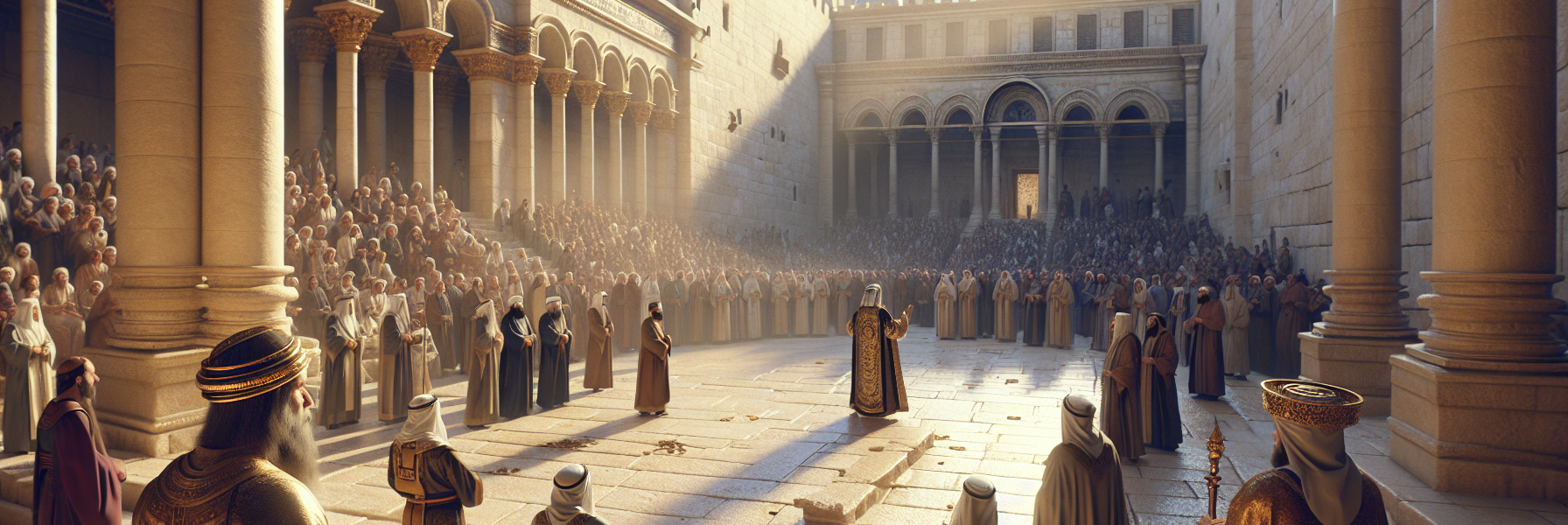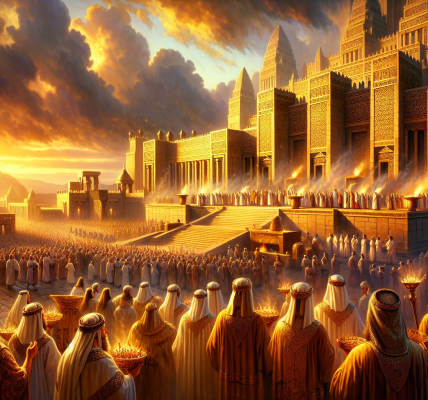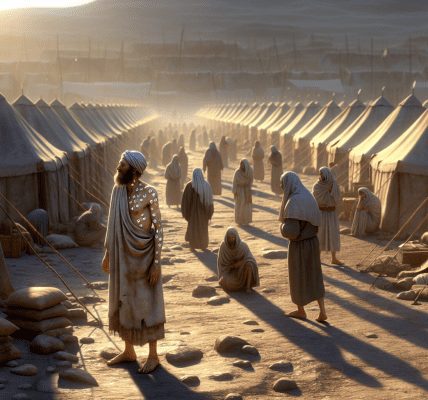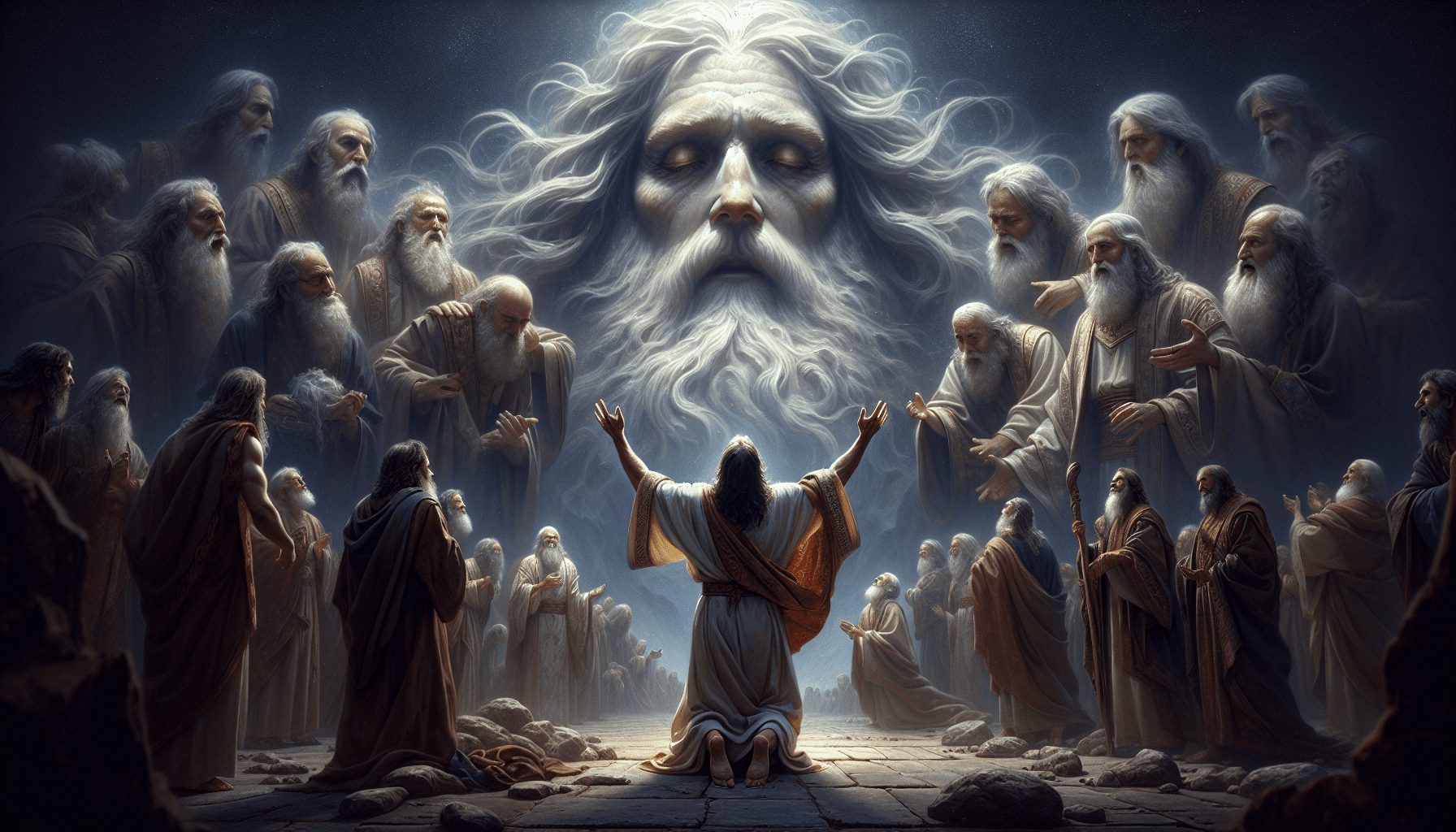**The Challenge in the Temple**
The sun hung high over Jerusalem, casting golden light upon the white stones of the Temple courts. The air buzzed with the murmurs of pilgrims, the clinking of coins, and the solemn chants of priests. Jesus stood in the midst of the great courtyard, teaching the people the good news of the Kingdom of God. His words carried authority, unlike the dry recitations of the scribes, and the crowd listened with rapt attention.
But not all were pleased. The chief priests, scribes, and elders lurked at the edges of the gathering, their faces tight with suspicion. They had long sought a way to trap Him, to discredit Him before the people. Now, they saw their chance. With calculated steps, they approached, their fine robes swaying, their expressions a mask of false respect.
“Teacher,” one of them began, his voice smooth as oil, “tell us, by what authority are you doing these things? Or who is it that gave you this authority?”
The question hung in the air, heavy with implication. If Jesus claimed divine authority, they could accuse Him of blasphemy. If He denied it, the people might turn from Him. The crowd fell silent, sensing the tension.
Jesus, knowing their hearts, fixed them with a gaze that seemed to pierce their very souls. “I will also ask you a question,” He said, His voice calm but firm. “Tell me, was the baptism of John from heaven, or from man?”
The leaders stiffened. Whispers passed among them as they huddled together, their minds racing. If they said, “From heaven,” Jesus would ask why they did not believe John. But if they said, “From man,” the people—who held John as a prophet—would turn against them.
After a tense silence, they muttered, “We do not know.”
A murmur of disbelief rippled through the crowd. These proud teachers, so confident in their own wisdom, now stood humiliated.
“Then neither will I tell you by what authority I do these things,” Jesus replied.
But He was not finished. Turning to the people, He began a parable, His voice carrying like a clear trumpet call.
“A man planted a vineyard, leased it to tenants, and went away for a long time. When the season came, he sent a servant to collect some of the fruit. But the tenants beat him and sent him away empty-handed. He sent another servant, and they treated him shamefully and wounded him. A third they killed.
“Finally, the owner said, ‘What shall I do? I will send my beloved son; perhaps they will respect him.’ But when the tenants saw him, they said among themselves, ‘This is the heir. Let us kill him, so the inheritance may be ours.’ So they cast him out of the vineyard and murdered him.”
Jesus paused, His eyes burning with righteous fire. “What then will the owner of the vineyard do to them? He will come and destroy those tenants and give the vineyard to others.”
A gasp rose from the crowd. The leaders’ faces darkened—they knew He spoke of them. They were the wicked tenants, rejecting God’s prophets and now plotting against His Son. Their fury burned, but they dared not lay hands on Him, for the people hung on His every word.
**The Trap of Taxes**
Undeterred, the leaders sent spies, men who pretended to be sincere, hoping to catch Him in His words. They approached with flattering smiles.
“Teacher,” they said, “we know that you speak and teach rightly, and show no partiality, but truly teach the way of God. Is it lawful for us to give tribute to Caesar, or not?”
Jesus saw through their deceit. If He said yes, the people might accuse Him of supporting Roman oppression. If He said no, the authorities could charge Him with rebellion.
He motioned for a denarius. “Show me a coin,” He said. One of them handed it to Him, the metal cool against His palm. He held it up, the image of Caesar gleaming in the sunlight.
“Whose likeness and inscription does this bear?”
“Caesar’s,” they answered.
“Then render to Caesar the things that are Caesar’s, and to God the things that are God’s.”
The spies stood stunned. His answer was perfect—unassailable. Their trap had failed. They slipped away, humiliated once more.
**The Resurrection and the Messiah**
The Sadducees, who denied the resurrection, stepped forward next, their smug faces betraying their confidence.
“Teacher,” one said, “Moses wrote for us that if a man’s brother dies, leaving a wife but no children, the man must take the widow and raise up offspring for his brother. Now there were seven brothers. The first took a wife and died childless. The second married her, then the third, and so on—all seven died, leaving no children. Finally, the woman also died. In the resurrection, whose wife will she be?”
A few snickers rose from their ranks. They thought they had Him cornered.
But Jesus answered, “The sons of this age marry and are given in marriage. But those who are considered worthy to attain to that age and the resurrection from the dead neither marry nor are given in marriage, for they cannot die anymore, because they are equal to angels and are sons of God, being sons of the resurrection.”
He then reminded them of Moses’ own words at the burning bush: “The Lord is the God of Abraham, the God of Isaac, and the God of Jacob. He is not God of the dead, but of the living, for all live to Him.”
The Sadducees fell silent, their clever argument shattered. Even some of the scribes murmured, “Teacher, you have spoken well.”
**The Son of David**
Seeing that none could trap Him, Jesus turned the challenge back upon them.
“How can they say that the Christ is David’s son? For David himself says in the Book of Psalms:
*’The Lord said to my Lord,
“Sit at my right hand,
until I make your enemies your footstool.”‘*
“David thus calls Him Lord, so how is He his son?”
No one dared answer. The truth was clear—the Messiah was not merely David’s descendant, but His Lord. The Son of God stood among them, and they could not withstand His wisdom.
As the shadows lengthened, the leaders slunk away, their pride wounded, their hatred burning brighter. But the people listened, their hearts stirred by the words of the One who spoke with the authority of heaven itself.




